The ’12 Days of Christmas’ is a classic holiday song first published in its current form in 1908. In a nod to the classic carol, join The Hockey Writers as we count down the 12 Days of Hockeymas. Each day, we will provide you with a piece of hockey history as we eagerly await the start of the 2020-21 NHL season.
The St. Louis Blues won their first-ever Stanley Cup during the 2018-19 season, after one of the unlikeliest turnarounds in NHL history. Along the way, they discovered a new head coach, a new starting goaltender, several new key players, and a one-of-a-kind rallying anthem.
In this article, we’ll take a deep look at the Stanley Cup season: laying the groundwork, the early struggles, the midseason turnaround, and the ultimate triumph. It may not be the most dominant season in Blues history, but it was the most storybook, and the only one so far that has ended with the ultimate prize.
Armstrong Sets the Stage
Discontent with a 44-32-6 2017-18 season that saw them finish fifth in the Central Division and ninth in the Western Conference (thereby missing the playoffs), general manager Doug Armstrong set off to restructure the team in the offseason. It started with subtraction. He traded Paul Stastny to the Winnipeg Jets at the previous trade deadline. Kyle Brodziak and Carter Hutton departed as free agents, and Armstrong chose not to sign Scottie Upshall back. Several more players would feature in his biggest offseason trade, and Dmitrij Jaskin would ultimately be waved before the season.
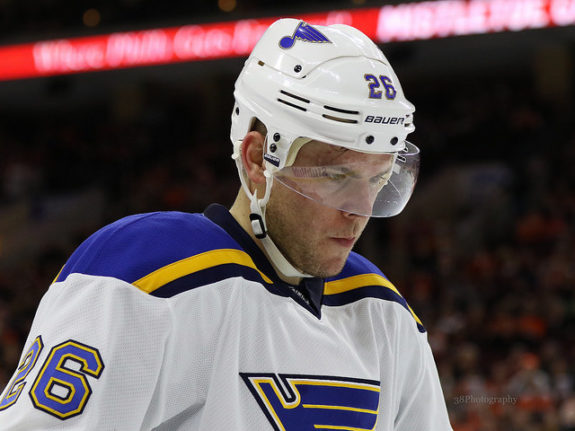
Paul Stastny (Amy Irvin / The Hockey Writers) 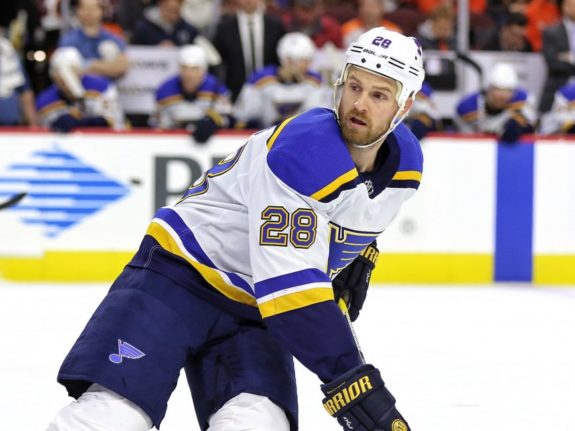
Kyle Brodziak(Amy Irvin / The Hockey Writers) 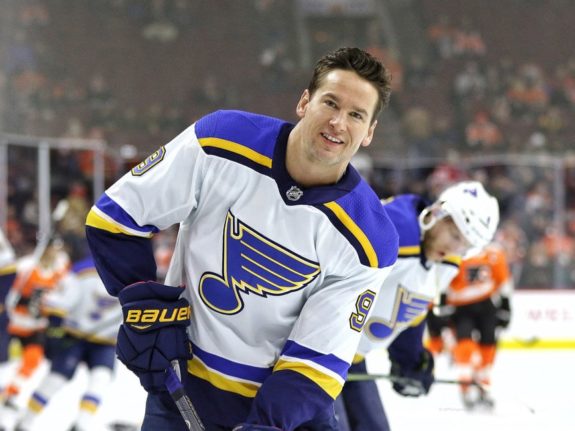
Scottie Upshall, St. Louis Blues (Amy Irvin / The Hockey Writers) 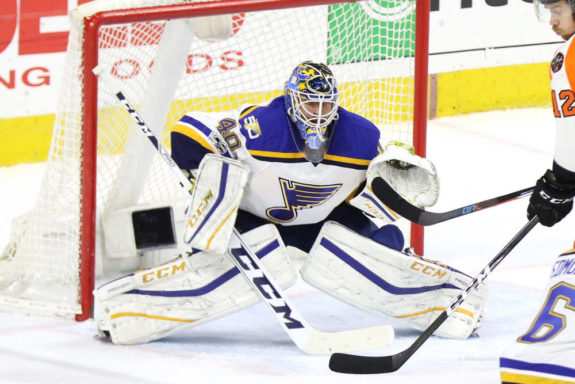
Carter Hutton (Amy Irvin / The Hockey Writers) 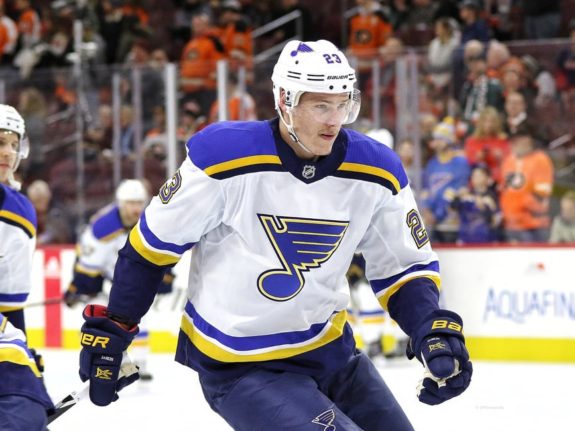
Dmitrij Jaskin (Amy Irvin / The Hockey Writers)
Then, Armstrong started the addition phase. On free agency day, he brought back David Perron, brought on Tyler Bozak, and signed Chad Johnson to replace Carter Hutton as the backup goalie on the cheap. Then, in the dying embers of the day, he pulled off his masterstroke: Armstrong traded prospect Tage Thompson, troublesome contracts in Patrik Berglund and Vladimir Sobotka, and two picks (a 2019 first and a 2021 second) for embattled Buffalo Sabres center Ryan O’Reilly.
That trade would rewrite the future of the franchise, as O’Reilly would become the team’s most critical forward and, according to recent reports, is set to become the Blues’ 23rd captain. As if that wasn’t enough, he signed St. Louis native Patrick Maroon to a one-year contract several days later. Entering the season, he waived Jaskin and made room for top prospects Robert Thomas and Jordan Kyrou. Kyrou wouldn’t ultimately feature significantly, but Thomas would evolve into more and more of a central player as the season and playoffs progressed.
Yeo’s Disastrous Start
With such an overhauled roster, the Blues entered the season with sky-high expectations. But those expe ctations received a stark reality check on opening night, a 5-1 drubbing at the hands of the Jets. In fact, the Blues lost five of their first six games and seven of their first nine, finishing October with a 3-4-3 record. Johnson had a few good starts in November, sparking a familiar sight for Blues’ fans: a goaltending controversy. But that hot streak quickly faded.
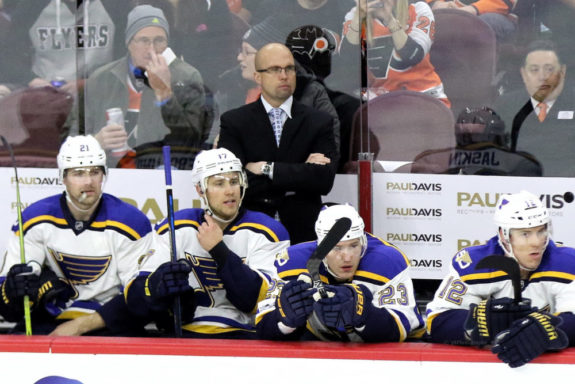
The Blues simply could not find success with Yeo, struggling mightily in what was meant to be just his second full season at the helm. Yeo tried to institute a man-to-man defensive scheme, which might have struggled under the best of circumstances, but veteran defenseman Jay Bouwmeester, coming off a severely injured season, looked completely lost in the system. His early-season performance was so poor, Elliotte Friedman would later reveal that Bouwmeester was days away from being waived.
Yeo’s team saw some success early in November but were back in the doldrums towards the end of the month. Ultimately, being shutout in three of four games, particularly against struggling teams like the archrival Chicago Blackhawks and the Los Angeles Kings, was enough to force Armstrong’s hand. He fired Yeo on Nov. 20, 2018, after a 7-9-3 start.
Berube Takes Over
In Yeo’s place, assistant coach Craig Berube, who had seen success coaching the Blues’ American Hockey League (AHL) affiliate the Chicago Wolves, would take the helm. It wasn’t his first opportunity in the NHL, as he’d served two seasons as the Philadelphia Flyers’ head coach from 2013-2015. But taking over as the Blues’ interim head coach was his chance at redemption.
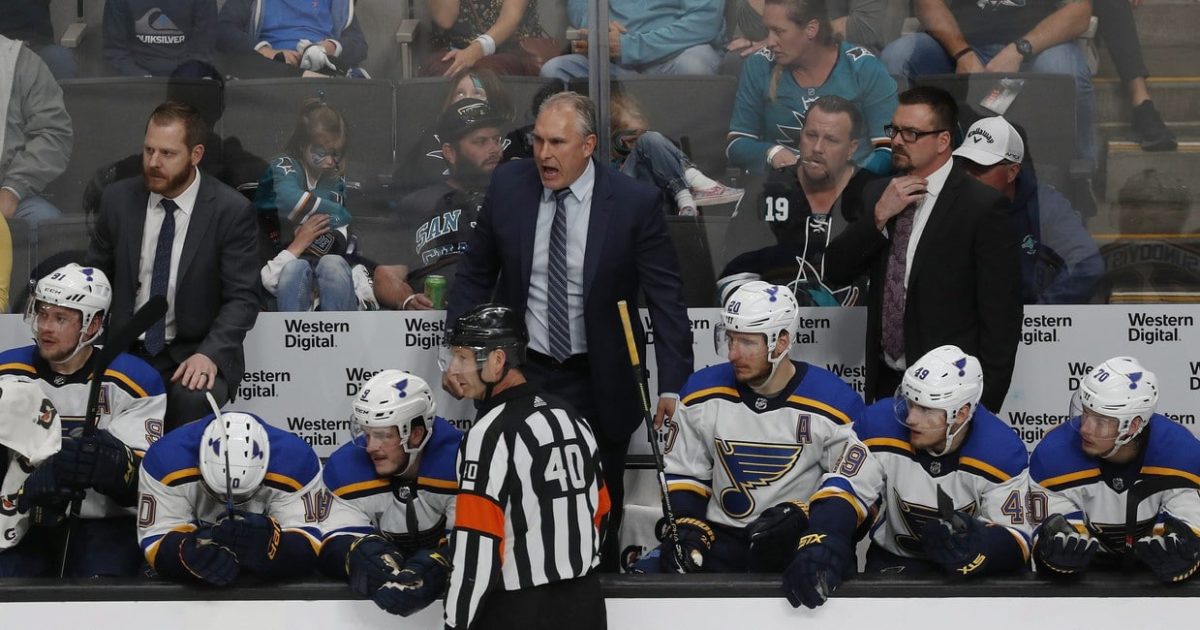
It wasn’t immediately smooth sailing for the Berube-led Blues. His debut was in a 4-1 road loss to the Nashville Predators. He did win his second game, also against Nashville, 6-2 at home, but then the Blues lost four of their next five games.
The Blues saw some success in December, winning six of nine games in one stretch. But they still had their problems. Johnson struggled and looked like an offseason mistake. And longtime starter Jake Allen once again seemed not to be the solution. Berube had helped, but the Blues needed to climb the mountain of a 15-18-4 record entering January that saw them at the bottom of the league. To do that, they’d need some outside help from an incredibly unlikely source.
Binnington to the Rescue
Jordan Binnington’s story has been told more fully elsewhere, but entering the 2018-19 season, he was an afterthought in the Blues’ organization. With Allen and Johnson in St. Louis and Ville Husso looking to be the goalie of the future, Binnington’s role was one of depth goalie and probable career minor-leaguer. But that wouldn’t satisfy the driven Richmond Hill, Ontario native.
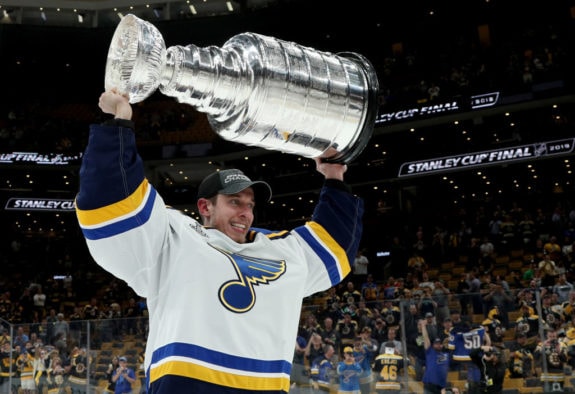
Binnington got called up in early December (leading to Armstrong waiving Johnson) but it would be almost a month until he saw a start. He started his first-ever NHL game on Jan. 7, 2019, a 3-0 road shutout of the Flyers. That ended up being a fateful weekend for the Blues, as it was also where they would discover the 80s song that would become their victory anthem: “Gloria” by Laura Branigan.
It wasn’t long until Binnington had clearly seized the starting role. They won four of five games after his debut. Then, after a brief skid that would prove to be their final bad streak, the Blues broke a franchise record by winning 11 consecutive games, most of them started by their new netminder. That streak featured a shutout against the Tampa Bay Lightning, followed shortly by three consecutive shutouts against the Arizona Coyotes, the Colorado Avalanche, and the Minnesota Wild.
It was the stretch that redefined the season and gave the Blues hope. They were a new team with a new goalie, a new confidence, and a new anthem. They cruised through the rest of the season like a different animal, and finished with a 45-28-9 record good for 99 points, which landed them second in the Central Division. They were now in the playoffs, but the franchise had reached that threshold many times before. This season, the outcome would be very different.
Victories Against the Jets, Stars
The Blues began the postseason with home-ice advantage against the Jets. They won each of their first two games but quickly dropped two in a row. It was a story all too familiar to Blues’ fans, who had seen the team choke away many two-game playoff advantages before. When they entered the third period of Game 5 down two goals, the worst seemed inevitable. But O’Reilly scored a power play goal early. Brayden Schenn equalized with six minutes remaining. Then, due to an unlikely line change, Bozak was able to set up Jaden Schwartz for the game-winner with 15 seconds remaining.
The Blues dominated Game 6, with Schwartz scoring just 23 seconds in. He’d score twice more, finishing a natural hat trick, before the Jets could answer. They scored two goals late, but the Blues still won a 3-2 game convincingly, allowing just 20 total shots in the game winning the expected goal battle (xGF) 3.28 to 1.68.
It was onto a date with the Dallas Stars in Round Two, a series that quickly saw the Blues facing elimination down three games to two. Needing a victory to stay alive, Berube made a surprising decision by giving young forward Sammy Blais, returning from injury earlier in the season, his first-ever playoff start. Blais delivered with his first playoff goal and an incredible nine hits. He’d add eight more in the final game of the series, but that is not why Blues fans remember Game 7.
The Blues once again seemed to have a stranglehold on Game 7, but they could not find a solution for St. Louis native and former Blues prospect Ben Bishop in the Dallas net. The game was tied at one at the end of regulation, and it was still tied at the end of the first overtime period. Then another St. Louis Native, Pat Maroon, scored what may be the most significant goal in franchise history (featured above) to send the Blues to their second Western Conference Final of the decade.
Controversy Against the Sharks
It was a rematch from 2016: the Blues facing the San Jose Sharks in the Western Conference Final. The Blues had lost the first time but had momentum on their side entering this series. That didn’t help them prevent a crushing 6-3 loss in Game 1, but they won Game 2 and looked in position to win Game 3 in overtime until the unbelievable happened.
Just five minutes into the period, the Sharks entered the zone with the puck. Falling and losing control, Timo Meier clearly passed the puck with his hand — an illegal and, at the time, non-reviewable play — to Logan Couture. Couture then dropped the puck to Erik Karlsson who scored the game-winning goal, sparking immediate and unanswered protests from the Blues.
The result stood, and the Blues had two options: fold under the pressure, or respond like they had since Binnington’s debut. They did the latter, winning three consecutive games. The final two games of the series went to the Blues by an aggregate score of 10-1, decisively stamping their ticket for the Stanley Cup Final.
Blues Seize Glory Against Bruins
There was only one test remaining: the Boston Bruins and the Stanley Cup Final. Once again, the Blues entered with momentum but lost Game 1. Game 2 seemed to be in jeopardy until Vladimir Tarasenko equalized late in the third period and unlikely hero Carl Gunnarsson scored in overtime to notch the Blues’ first-ever Stanley Cup game-winning goal.
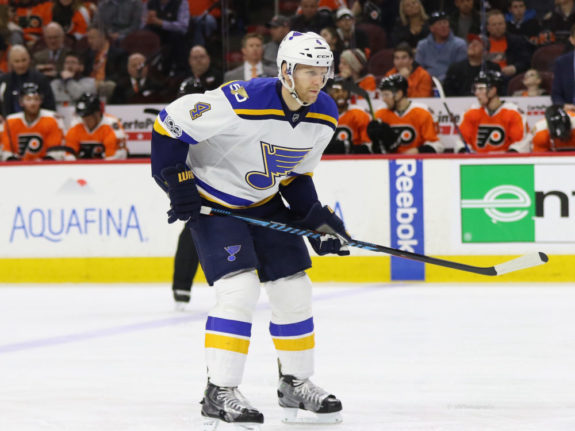
The Blues lost Game 3, but won the next two thanks to a 38-save performance by Binnington in Game 5. They headed home with a chance to clinch their first-ever Stanley Cup on home ice, but it wouldn’t be that easy. They played arguably their worst game of the postseason with the pressure on, losing 5-1. The team that had proven to be bounce back artists all season would have to prove it one more time with the highest stakes imaginable.
The Bruins dominated the first period, managing 12 shots to the Blues’ four. But St. Louis made their four shots count, with two late-period goals from O’Reilly and Pietrangelo. A stretching Binnington pad save against Joakim Nordstrom midway through the third period, followed shortly by goals from Schenn and native Bostonian Zach Sanford gave the Blues a seemingly insurmountable 4-0 lead. But Blues fans had seen too much to celebrate until the final second ticked off the clock.
The players stormed the ice and celebrated the franchise’s first-ever Stanley Cup. Veterans Jay Bouwmeester and Alex Steen fulfilled the greatest achievement of their long career, while rookies like Thomas and Binnington reached the pinnacle before their career had truly started. But it didn’t matter. On that ice, they were all champions, and together, they had done the unthinkable. From last place on Jan. 1 to a Stanley Cup Championship, the Blues’ 2018-19 season will never be replicated.